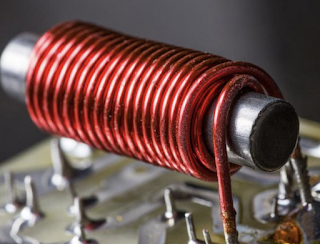I come today with more questions than answers. The English language, it turns out, can support a wide variety of localized pronunciations for the same word, with little clear root as to where they come from and where they go. Today we'll be looking at a car part, the 'solenoid.' A solenoid is a "coil of insulated wire carrying an electrical current and having magnetic properties", which entered the English language in 1827 from French solénoïde (via etymonline). The standard pronunciation is /sɒlənoɪd/, 'soll-uh-noid', but I've found at least two alternative pronunciations.

In the Beach Boys Song "Cherry Cherry Coupe" (1963), Mike Love sings about a car with doors that open with the 'cellunoid' [sɛljʊnoɪd] system. You may wonder how we know that this is supposed to be the same word as 'solenoid', beyond the general consonant contours being the same, and the clue is in the car door description - solenoids were used in technology that made doors 'pop' open without the need for car handles.
Door handles are off but you know I'll never miss 'em
They open when i want with the cellunoid system
We find an early reference to this in Volume 80 of "American Bicyclist and Motorcyclist" (1959). The same device is also advertised in Volume 57 of Playthings, with the same verbiage.


Volumes 31-32 of Gas Appliance Merchandising (1959) mention 'cellunoid valves' as self-evidently recognized car parts.

By the 1980s, the term appears to be falling out of favor. Some of the last references I can find to it are in "Adapting Work Sites for People with Disabilities" (1983).

This 1985 reference seems to be a metaphorical use by a psychotherapy patient (Understanding Human Behavior in Health and Illness.

And this 1998 hit is firmly in the world of literature (Five Fingers Review).

And so it seems that the cellunoid pronunciation and spelling has died out, having seen its peak in the late 50s and early 60s, and descending into obscurity by the 80s and 90s. It's not clear where this alternative pronunciation and spelling came from. It smells of being a trademark to me, but a search through the United States Patent and Trademark Office site didn't turn up any hits in patents or trademark registrations. In fact, trying to do so redirects me to patents and trademarks featuring the word celluloid instead.

Having hit the end of one mystery of history, let's start another. This is the pronunciation "silenoid" [sɪlənoɪd]. At first glance, it looks like a descendant of 'cellunoid'. The y-sound [j] in 'lyu' appears to have been dropped, meaning that the sound change called "yod-dropping" happened. It also looks like the 'eh' [ɛ] sound was raised to short 'ih' [ɪ]. I don't know if there's any sort of documented FELL-FILL merger, but English vowels tend to merge and change before L, as I've written in Pre-L Back Vowel Madness.
Unexpectedly, we have an early citation for 'silenoid' than we do for "cellunoid". The Journal of General Psychology Volumes 35-36 (1946) mentions the 'silenoid'.

Further research on "silenoid" is unfortunately complicated by the fact that "silenoid" is also used to refer to flowering plants from the "Silene" genus. This tantalizingly early example of "silenoid" (1915!) is in fact a reference to carnations (Contributions by the New York Botanical Garden).

While I couldn't find any later recordings of someone using 'cellunoid', I was able to find this pronunciations of "silenoid", thanks to the folks at the Smiley Smile forums: "I did check to see if the silenoids were working."
And a more modern example from Donut Media, with "fuel silenoid and NOS silenoid".

Move over, "nookular"!
ReplyDelete(Why isn't a solenoid simply called a coil in English? It is elsewhere.)
Because of our rampant francophilia, presumably. :)
DeleteResearching this really reminded me of this old language log post on 'nucular'.